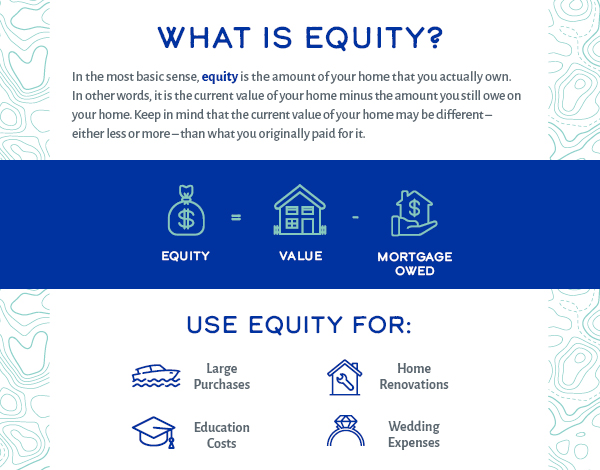Help me understand home equity loans and lines
If you own your home, you’ve likely heard about the concept of building equity, and with it a herd of questions: what is equity? How does equity work? How does it benefit me? Our article will sort through some of the information around home equity loans and home equity lines of credit to help you understand them and whether they are a good solution for you.
Understanding equity and how to calculate
equity
In the most basic sense, equity is the amount of your home that you actually own. In other words, it is the current value of your home minus the amount you still owe on your home. Keep in mind that the current value of your home may be different – either less or more – than what you originally paid for it.
To estimate the current value of your home, websites like Zillow or Trulia provide
current market information. These values are estimates, though, and while helpful in estimating
the current value of your home, a home appraisal will be required to accurately assess your
home’s value.
Once you have an understanding of how much your home is worth, you need to
know exactly how much you owe on your home. It’s then simply a matter of subtracting how much
you owe from your home’s value.
Understanding home equity
The infographic below helps explain equity as well as how equity can be used.

Qualifying for a Home Equity Loan or Home Equity
Line of Credit (HELOC)
One of the first questions you may ask after understanding equity is, “Do I qualify for a Home
Equity product?” Qualifying for a Home Equity product will depend on several factors, not the
least of which is your financial institution’s lending policy. What will be fairly consistent
across the board, though, is good credit and an acceptable debt-to-income ratio(Opens in a new window).
Your credit score is
going to be an important factor in any lending decision. It is essentially a mathematical
calculation of the likelihood you’ll be able to repay your loan. Several factors impact your
credit score, including late payments, length of your credit history and how much of your
available credit you’ve used. It’s critical to not only know your score but to be aware of
what’s actually in your credit report, too.
Watch our brief video to help you understand your
credit
Debt-to-income (DTI) measures how much you pay in debt against how much income you make.
Generally speaking, the lower your DTI the better. A higher DTI may indicate to your financial
institution that you are stretched too financially thin and won’t be able to make payments on
your Home Equity product. Even if you have good credit, a high DTI can impact your eligibility
for a Home Equity Loan or HELOC.
The difference between a Home Equity Loan and a
Home Equity Line of Credit and the benefits over other loans
When looking at home equity products, you will typically see both Home Equity Loans and Home Equity Lines of Credit. There are definite advantages to both of these products, so let’s break down how they differ and the benefits of home equity.
A Home Equity Loan is similar to a Personal Loan in that it carries a definitive term (how long
your payoff period is) and a fixed interest rate. You receive the amount you are approved for as
a lump sum. The total amount you can borrow is determined by your financial institution’s
loan-to-value (LTV) policy as well as the value of your home.
A Home Equity Line of
Credit (HELOC), on the other hand, provides you with an amount against which you can borrow as
much or as little as you need. The interest rate on HELOCs is often variable, but is only
charged when you draw against the balance. The amount of your HELOC is determined just as the
amount of a Home Equity Loan would be. Your financial institution’s LTV policy and your home’s
value will determine the amount you could be approved for. Once you are approved, you can borrow
against the line as often as you need.
Watch our brief video to understand equity and the
difference between Home Equity Loans and HELOCs
The benefit of a Home Equity Loan or a HELOC comes from the fact that these products are secured by your home’s equity. Because of this, these products will typically carry a lower interest rate than an unsecured Personal Loan. Lower interest rates can save you hundreds, even thousands, of dollars.
In addition, the fact these products are secured allows you to borrow more money than you usually can with a Personal Loan, making big-ticket purchases possible. This makes Home Equity Loans and Home Equity Lines of Credit appealing when you need funds for things like home renovations or tuition costs.
Find out more about Home Equity Loans and Home Equity Lines of Credit.
Other Home articles you may be interested in
- Couple refinancing their home for projectsHome
Are Mortgage Refinances or Home Equity Loans Better?
One of the biggest advantages to owning your home is the ability to tap into the equity you build, or the amount of your house that you’ve paid off. When you need to access that equity as cash, though, you’re faced with a couple of options. - A nice houseHome
Here's What Your Home's Equity Can Be Used For
What can you do with the equity in your home? Find out how to use it, which is better, and how to qualify for either. - Couple speaking to a mortgage expertHome
Home Buying Tips Straight From the Experts
5 insider tips from mortgage officers. Find out what advice they would give you about buying a house. And find out why it’s normal to feel overwhelmed.